task1.1:
1 #include <stdio.h> 2 #define N 5 3 4 void input(int x[], int n); 5 void output(int x[], int n); 6 void find_min_max(int x[], int n, int *pmin, int *pmax); 7 8 int main() { 9 int a[N]; 10 int min, max; 11 12 printf("录入%d个数据:\n", N); 13 input(a, N); 14 15 printf("数据是: \n"); 16 output(a, N); 17 18 printf("数据处理...\n"); 19 find_min_max(a, N, &min, &max); 20 21 printf("输出结果:\n"); 22 printf("min = %d, max = %d\n", min, max); 23 24 return 0; 25 } 26 27 void input(int x[], int n) { 28 int i; 29 30 for(i = 0; i < n; ++i) 31 scanf("%d", &x[i]); 32 } 33 34 void output(int x[], int n) { 35 int i; 36 37 for(i = 0; i < n; ++i) 38 printf("%d ", x[i]); 39 printf("\n"); 40 } 41 42 void find_min_max(int x[], int n, int *pmin, int *pmax) { 43 int i; 44 45 *pmin = *pmax = x[0]; 46 47 for(i = 0; i < n; ++i) 48 if(x[i] < *pmin) 49 *pmin = x[i]; 50 else if(x[i] > *pmax) 51 *pmax = x[i]; 52 }
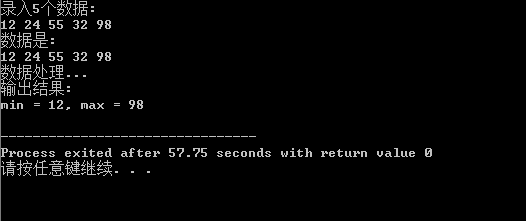
问题1:找出最小值和最大值。
问题2:指向x[0]的地址。
task1.2:
1 #include <stdio.h> 2 #define N 5 3 4 void input(int x[], int n); 5 void output(int x[], int n); 6 int *find_max(int x[], int n); 7 8 int main() { 9 int a[N]; 10 int *pmax; 11 12 printf("录入%d个数据:\n", N); 13 input(a, N); 14 15 printf("数据是: \n"); 16 output(a, N); 17 18 printf("数据处理...\n"); 19 pmax = find_max(a, N); 20 21 printf("输出结果:\n"); 22 printf("max = %d\n", *pmax); 23 24 return 0; 25 } 26 27 void input(int x[], int n) { 28 int i; 29 30 for(i = 0; i < n; ++i) 31 scanf("%d", &x[i]); 32 } 33 34 void output(int x[], int n) { 35 int i; 36 37 for(i = 0; i < n; ++i) 38 printf("%d ", x[i]); 39 printf("\n"); 40 } 41 42 int *find_max(int x[], int n) { 43 int max_index = 0; 44 int i; 45 46 for(i = 0; i < n; ++i) 47 if(x[i] > x[max_index]) 48 max_index = i; 49 50 return &x[max_index]; 51 }
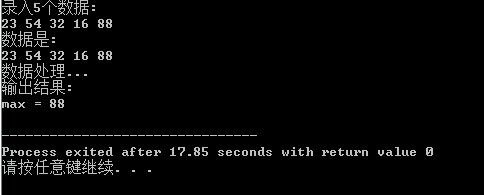
问题1:返回找出的最大值的地址。
问题2:可以。
task2.1:
1 #include <stdio.h> 2 #include <string.h> 3 #define N 80 4 5 int main() { 6 char s1[N] = "Learning makes me happy"; 7 char s2[N] = "Learning makes me sleepy"; 8 char tmp[N]; 9 10 printf("sizeof(s1) vs. strlen(s1): \n"); 11 printf("sizeof(s1) = %d\n", sizeof(s1)); 12 printf("strlen(s1) = %d\n", strlen(s1)); 13 14 printf("\nbefore swap: \n"); 15 printf("s1: %s\n", s1); 16 printf("s2: %s\n", s2); 17 18 printf("\nswapping...\n"); 19 strcpy(tmp, s1); 20 strcpy(s1, s2); 21 strcpy(s2, tmp); 22 23 printf("\nafter swap: \n"); 24 printf("s1: %s\n", s1); 25 printf("s2: %s\n", s2); 26 27 return 0; 28 }
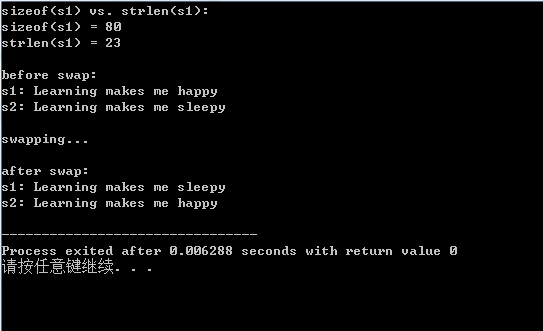
问题1:s1的大小为24;sizeof(s1)计算的是计算s1中字符串所占字节数;strlen(s1)计算的是s1中字符串的长度(不包括'\0')。
问题2:不能,替换的内容中表示s1就是整个字符串常量,而原代码中s1表示字符型数组。
问题3:内容互换。
task2.2:
1 #include <stdio.h> 2 #include <string.h> 3 #define N 80 4 5 int main() { 6 char *s1 = "Learning makes me happy"; 7 char *s2 = "Learning makes me sleepy"; 8 char *tmp; 9 10 printf("sizeof(s1) vs. strlen(s1): \n"); 11 printf("sizeof(s1) = %d\n", sizeof(s1)); 12 printf("strlen(s1) = %d\n", strlen(s1)); 13 14 printf("\nbefore swap: \n"); 15 printf("s1: %s\n", s1); 16 printf("s2: %s\n", s2); 17 18 printf("\nswapping...\n"); 19 tmp = s1; 20 s1 = s2; 21 s2 = tmp; 22 23 printf("\nafter swap: \n"); 24 printf("s1: %s\n", s1); 25 printf("s2: %s\n", s2); 26 27 return 0; 28 }
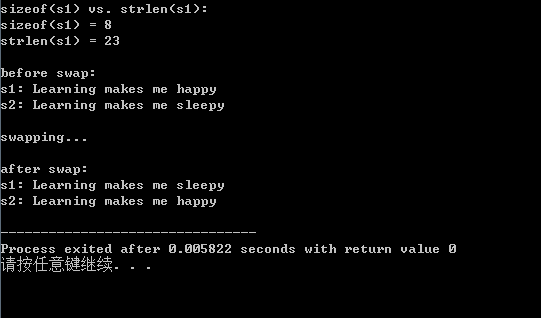
问题1:s1中存放的是对应字符串的地址;sizeof(s1)计算的是指针的大小;strlen(s1)统计的是s1指向的字符串的长度。
问题2:能;task2.1中是定义数组储存字符串,这里是指针。
问题3:交换的是s1和s2的地址;字符串常量在内存中没有互换。
task3:
1 #include <stdio.h> 2 3 int main() { 4 int x[2][4] = {{1, 9, 8, 4}, {2, 0, 4, 9}}; 5 int i, j; 6 int *ptr1; // 指针变量,存放int类型数据的地址 7 int(*ptr2)[4]; // 指针变量,指向包含4个int元素的一维数组 8 9 printf("输出1: 使用数组名、下标直接访问二维数组元素\n"); 10 for (i = 0; i < 2; ++i) { 11 for (j = 0; j < 4; ++j) 12 printf("%d ", x[i][j]); 13 printf("\n"); 14 } 15 16 printf("\n输出2: 使用指针变量ptr1(指向元素)间接访问\n"); 17 for (ptr1 = &x[0][0], i = 0; ptr1 < &x[0][0] + 8; ++ptr1, ++i) { 18 printf("%d ", *ptr1); 19 20 if ((i + 1) % 4 == 0) 21 printf("\n"); 22 } 23 24 printf("\n输出3: 使用指针变量ptr2(指向一维数组)间接访问\n"); 25 for (ptr2 = x; ptr2 < x + 2; ++ptr2) { 26 for (j = 0; j < 4; ++j) 27 printf("%d ", *(*ptr2 + j)); 28 printf("\n"); 29 } 30 31 return 0; 32 }

问题:第一种的ptr表示指针,第二种的ptr表示数组。
task4:
1 #include <stdio.h> 2 #define N 80 3 4 void replace(char *str, char old_char, char new_char); // 函数声明 5 6 int main() { 7 char text[N] = "Programming is difficult or not, it is a question."; 8 9 printf("原始文本: \n"); 10 printf("%s\n", text); 11 12 replace(text, 'i', '*'); // 函数调用 注意字符形参写法,单引号不能少 13 14 printf("处理后文本: \n"); 15 printf("%s\n", text); 16 17 return 0; 18 } 19 20 // 函数定义 21 void replace(char *str, char old_char, char new_char) { 22 int i; 23 24 while(*str) { 25 if(*str == old_char) 26 *str = new_char; 27 str++; 28 } 29 }
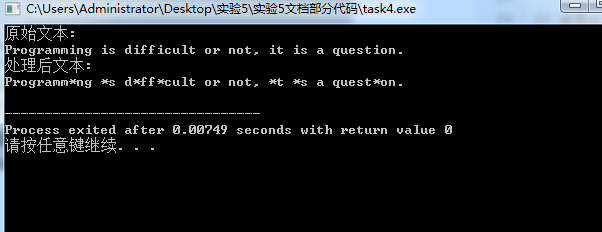
问题1:replace的功能是用新字符代替旧字符。
问题2:可以。
task5:
1 #include <stdio.h> 2 #define N 80 3 4 char *str_trunc(char *str, char x); 5 6 int main() { 7 char str[N]; 8 char ch; 9 10 while(printf("输入字符串: "), gets(str) != NULL) { 11 printf("输入一个字符: "); 12 ch = getchar(); 13 14 printf("截断处理...\n"); 15 str_trunc(str, ch); // 函数调用 16 17 printf("截断处理后的字符串: %s\n\n", str); 18 getchar(); 19 } 20 21 return 0; 22 } 23 24 // 函数str_trunc定义 25 // 功能: 对字符串作截断处理,把指定字符自第一次出现及其后的字符全部删除, 并返回字符串地址 26 // 待补足... 27 // xxx 28 char *str_trunc(char*str,char x) 29 { 30 char *t=str; 31 32 while(*t!='\0') 33 { 34 if(*t==x) 35 { 36 *t='\0'; 37 return t; 38 } 39 40 41 t++; 42 } 43 44 45 46 }
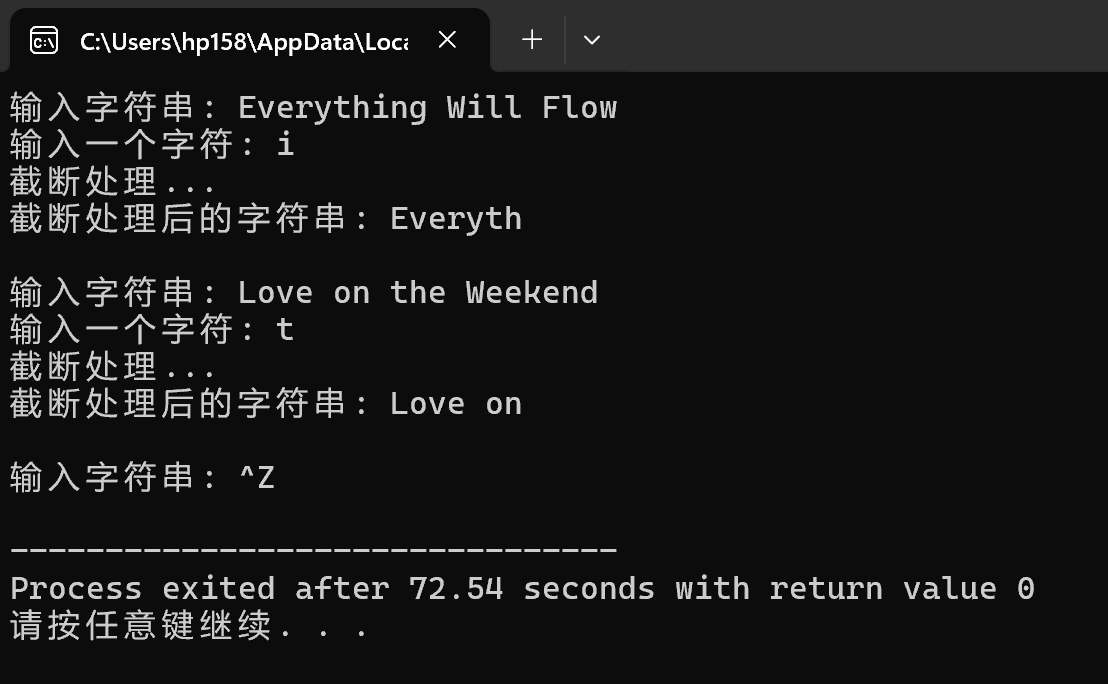
问题:执行第二个字符串操作时无字符型输出结果;作用是读取上一循环结束后输入的回车,确保下一循环按要求顺利执行。
task6:
1 #include <stdio.h> 2 #include <string.h> 3 #define N 5 4 5 int check_id(char *str); // 函数声明 6 7 int main() 8 { 9 char *pid[N] = {"31010120000721656X", 10 "3301061996X0203301", 11 "53010220051126571", 12 "510104199211197977", 13 "53010220051126133Y"}; 14 int i; 15 16 for (i = 0; i < N; ++i) 17 if (check_id(pid[i])) // 函数调用 18 printf("%s\tTrue\n", pid[i]); 19 else 20 printf("%s\tFalse\n", pid[i]); 21 22 return 0; 23 } 24 25 // 函数定义 26 // 功能: 检查指针str指向的身份证号码串形式上是否合法 27 // 形式合法,返回1,否则,返回0 28 int check_id(char *str) { 29 char *t=str; 30 int i=0; 31 if(strlen(str)!=18) 32 return 0; 33 if(strlen(str)==18) 34 { 35 while(*t!='\0') 36 { 37 if((*t>'9'&&*t!='X')||(*t=='X'&&t!=str+17)) 38 { 39 return 0; 40 } 41 42 t++; 43 } 44 45 } 46 return 1; 47 }

task7:
1 #include <stdio.h> 2 #define N 80 3 void encoder(char *str, int n); // 函数声明 4 void decoder(char *str, int n); // 函数声明 5 6 int main() { 7 char words[N]; 8 int n; 9 10 printf("输入英文文本: "); 11 gets(words); 12 13 printf("输入n: "); 14 scanf("%d", &n); 15 16 printf("编码后的英文文本: "); 17 encoder(words, n); // 函数调用 18 printf("%s\n", words); 19 20 printf("对编码后的英文文本解码: "); 21 decoder(words, n); // 函数调用 22 printf("%s\n", words); 23 24 return 0; 25 } 26 27 /*函数定义 28 功能:对s指向的字符串进行编码处理 29 编码规则: 30 对于a~z或A~Z之间的字母字符,用其后第n个字符替换; 其它非字母字符,保持不变 31 */ 32 void encoder(char *str, int n) { 33 char *t=str; 34 while(*t!='\0') 35 { 36 if(*t<='Z'&&*t>='A') 37 { 38 *t=*t+n; 39 if(*t>'Z') 40 { 41 *t='A'+((*t-'Z')%26-1); 42 } 43 t++; 44 } 45 else if(*t<='z'&&*t>='a') 46 { 47 *t=*t+n; 48 if(*t>'z') 49 { 50 *t='a'+((*t-'z')%26-1); 51 } 52 t++; 53 } 54 else 55 { 56 *t=*t; 57 t++; 58 } 59 60 } 61 } 62 63 /*函数定义 64 功能:对s指向的字符串进行解码处理 65 解码规则: 66 对于a~z或A~Z之间的字母字符,用其前面第n个字符替换; 其它非字母字符,保持不变 67 */ 68 void decoder(char *str, int n) { 69 char *t=str; 70 while(*t!='\0') 71 { 72 if(*t<='Z'&&*t>='A') 73 { 74 *t=*t-n; 75 if(*t<'A') 76 { 77 *t='Z'-(('A'-*t)%26+1); 78 } 79 t++; 80 } 81 else if(*t<='z'&&*t>='a') 82 { 83 *t=*t-n; 84 if(*t<'a') 85 { 86 *t='z'-(('a'-*t)%26+1); 87 } 88 t++; 89 } 90 else 91 { 92 *t=*t; 93 t++; 94 } 95 } 96 }
1 #include <stdio.h> 2 #define N 80 3 void encoder(char *str, int n); // 函数声明 4 void decoder(char *str, int n); // 函数声明 5 6 int main() { 7 char words[N]; 8 int n; 9 10 printf("输入英文文本: "); 11 gets(words); 12 13 printf("输入n: "); 14 scanf("%d", &n); 15 16 printf("编码后的英文文本: "); 17 encoder(words, n); // 函数调用 18 printf("%s\n", words); 19 20 printf("对编码后的英文文本解码: "); 21 decoder(words, n); // 函数调用 22 printf("%s\n", words); 23 24 return 0; 25 } 26 27 /*函数定义 28 功能:对s指向的字符串进行编码处理 29 编码规则: 30 对于a~z或A~Z之间的字母字符,用其后第n个字符替换; 其它非字母字符,保持不变 31 */ 32 void encoder(char *str, int n) { 33 char *t=str; 34 while(*t!='\0') 35 { 36 if(*t<='Z'&&*t>='A') 37 { 38 *t=*t+n; 39 if(*t>'Z') 40 { 41 *t='A'+((*t-'Z')%26-1); 42 } 43 t++; 44 } 45 else if(*t<='z'&&*t>='a') 46 { 47 *t=*t+n; 48 if(*t>'z') 49 { 50 *t='a'+((*t-'z')%26-1); 51 } 52 t++; 53 } 54 else 55 { 56 *t=*t; 57 t++; 58 } 59 60 } 61 } 62 63 /*函数定义 64 功能:对s指向的字符串进行解码处理 65 解码规则: 66 对于a~z或A~Z之间的字母字符,用其前面第n个字符替换; 其它非字母字符,保持不变 67 */ 68 void decoder(char *str, int n) { 69 char *t=str; 70 while(*t!='\0') 71 { 72 if(*t<='Z'&&*t>='A') 73 { 74 *t=*t-n; 75 if(*t<'A') 76 { 77 *t='Z'-(('A'-*t)%26+1); 78 } 79 t++; 80 } 81 else if(*t<='z'&&*t>='a') 82 { 83 *t=*t-n; 84 if(*t<'a') 85 { 86 *t='z'-(('a'-*t)%26+1); 87 } 88 t++; 89 } 90 else 91 { 92 *t=*t; 93 t++; 94 } 95 } 96 }
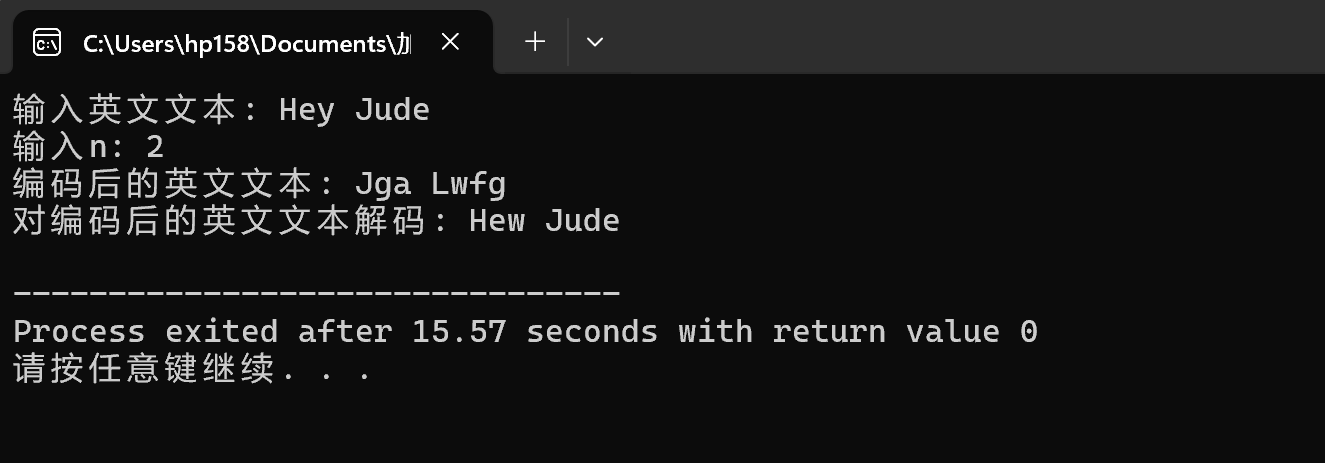


task8:
1 #include <stdio.h> 2 #include <string.h> 3 int main(int argc, char *argv[]) { 4 5 int i,j; 6 char *t; 7 8 for(i = 1; i < argc-1; ++i) 9 { 10 for(j=i+1;j<argc;++j) 11 { 12 13 if(strcmp(argv[i],argv[j])>0) 14 { 15 t=argv[j]; 16 argv[j]=argv[i]; 17 argv[i]=t; 18 } 19 } 20 } 21 22 for(i = 1; i < argc; ++i) 23 printf("hello, %s\n", argv[i]); 24 25 return 0; 26 }





